Charging your electric car or plug-in hybrid at home is the most cost-effective way to run a battery-powered car.
Public charging is fast but invariably comes at higher prices and occasionally limited availability. It's easier and cheaper to charge your EV overnight at your house, if you can.
This guide will talk you through everything you need to know about home charging, including the different types of chargers and how much it'll cost you.
Home charging overview
| Type of home charger | Speed | Pros | Cons |
| UK three-pin home socket | ~2.3kW – only really useful for small-battery EVs or topping up. Fully charging a medium-sized EV battery can take 24 hours or more |
|
|
| 3kW home charger | ~3.6kW – around 12 hours or more to fully charge most EVs |
|
|
| 7kW home charger | ~7.4kW – 6-8 hours to fully charge most EVs |
|
|
| 11kW and 22kW three-phase chargers | 11kW or 22kW – 2-3 hours to charge most EVs |
|
|
Can you charge an electric car at home?
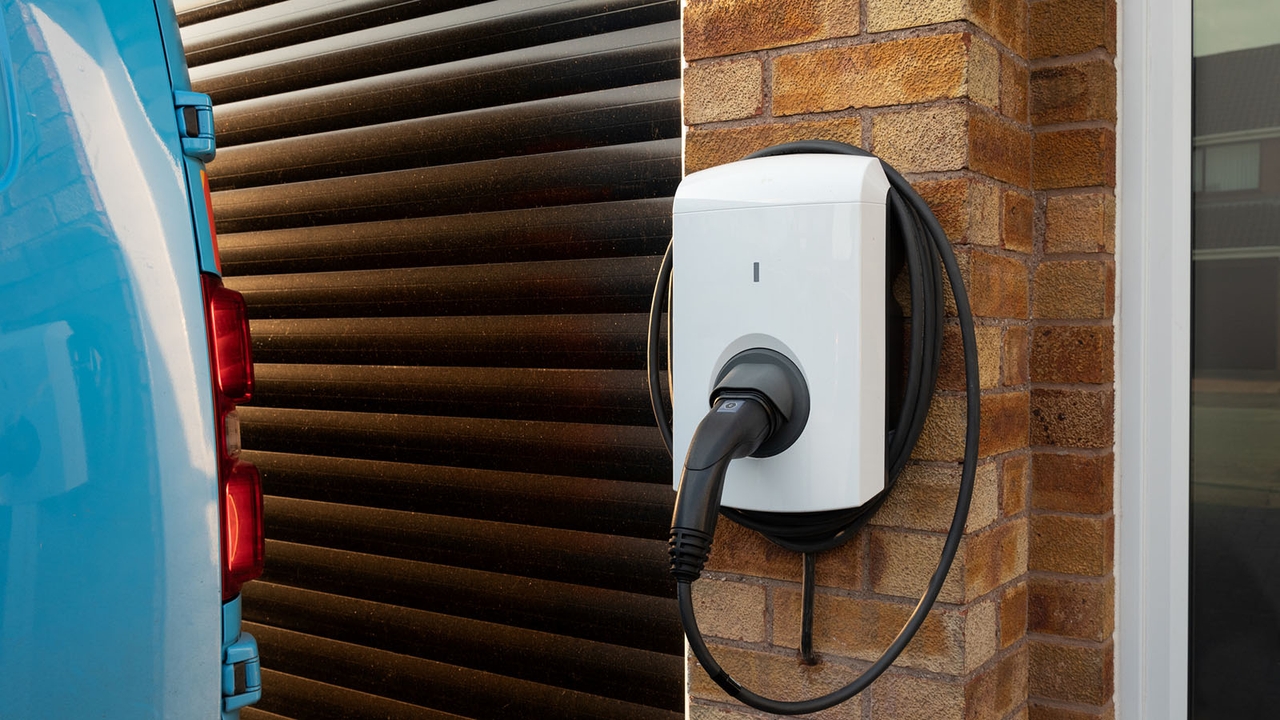
Yes! It's a good idea to have a proper EV charging point installed if you don’t already have one, because this will be much faster than using a standard three-pin socket. From 2022, all newly built homes will come with a charging point installed to help boost the uptake of plug-in vehicles.
How to charge an electric car at home
Charging your EV at home is simple:
- Park your EV so your charging cable comfortably reaches the car's charging port
- If using a dedicated EV charger, plug the cable into your car's charging port
- If connecting to a three-pin domestic socket, locate one that reaches your car – ideally, a dedicated outdoor covered socket
- Once the car is connected, it'll start charging automatically and will keep going all the way to 100%
- You can adjust the maximum charge your car takes either through its infotainment system or on the charger itself – for example, limiting it to an 80% charge for daily use
- You can also set what time the car starts charging – handy if your tariff lets you take advantage of lower night-time electricity costs
Can you plug your car in to a standard household socket?
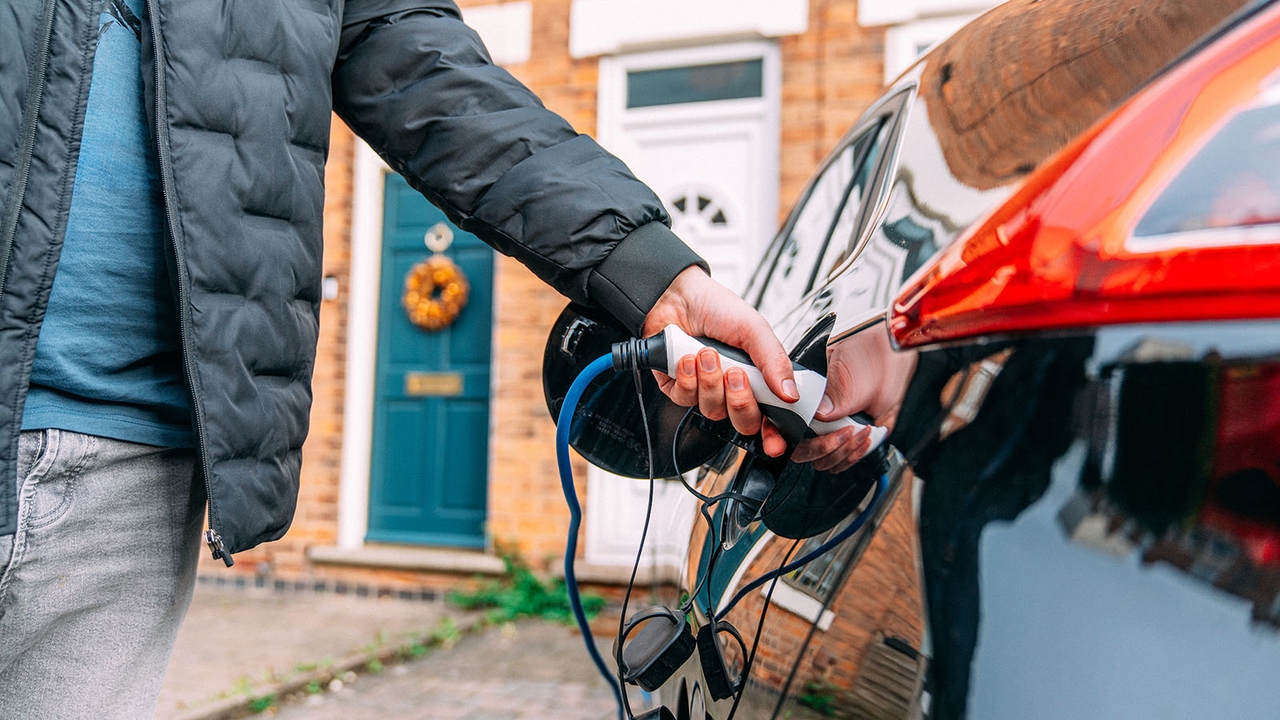
Yes, you can plug your car in to a standard UK three-pin socket. You'll need a charging cable with the correct connector for your EV on one end and a three-pin socket on the other. This isn't the most effective way to charge at home, however, because it's much slower than a dedicated EV charging point.
Charging from a standard three-pin socket also means you’re drawing current at close to the maximum rate. In houses with old or dodgy wiring, or if there are several other high-draw devices on at the same time, there’s a risk you could cause an electrical failure.
Which EV charger is better, 3kW or 7kW?
Dedicated EV home chargers are usually available with two different outputs. You'll find 3kW boxes – often 3.6kW in practice – and 7kW boxes, sometimes sold as 7.2 or 7.4kW. The higher the number, the faster your car's battery will charge. For almost all situations, you're better off choosing a higher-power 7kW version.
7kW chargers can fully charge most EVs overnight, and the price difference between installing a 7kW charger or a 3kW charger is very small. Certain plug-in hybrids and older EVs can only accept a 3.6kW charge rate so, for them, the lesser charger is enough. Even then, however, you're still probably better off with a 7kW model as your car will still draw charge at its max rate, and it'll future-proof your home if you upgrade your EV later on.
How much does it cost to charge an EV at home?

It's easy to work out how much charging your EV at home will cost. You simply multiply the number of kWh you put into your car's battery by the rate you pay for electricity.
For example, if your EV has a 50kWh battery pack and you want to fully charge it from 0-100%, you'll need 50kWh of electricity. At the time of writing, UK electricity prices are 24.5p per kWh (or £0.245) – 50 x 0.245 = 12.25 – so a full 0-100% charge will cost £12.25.
Some energy providers offer EV-specific tariffs with discounted rates for home charging, often in exchange for a slightly higher standard rate. These discounted EV rates are normally only available at night-time when overall demand for electricity is low – you can schedule your EV to only charge at these times.
What to consider when setting up home EV charging
- Location – where should you have your EV charger installed?
- Close enough to your parking space that the cable reaches your EV
- In a position where it can be connected to your home electricity supply
- Will you be running cables across the pavement? If so, you need a cable protector
- Tariffs – should you get an EV-specific energy tariff?
- These offer a discounted rate for electricity used overnight to charge your EV
- You'll normally pay a little more for your standard rate electricity in return
- They're a good option for most EV owners
- They might not save you money if your annual mileage is quite low
- Installation – EV chargers need to be professionally installed
- By law, charging units must be installed and certified by a qualified electrician
- You'll need to factor in the cost of installation as well as the cost of the charging unit itself
- £1,500 is a rough ballpark estimate for total cost
- It may cost much more if your home requires a more complex installation
Can I install an EV charger at home myself?
In short, no. While you usually don’t need to seek permission to install a charger, unless you’re renting or your house is listed, any electrical work needs be carried out by a qualified electrician. That’s especially true for EV chargers, which need to be safely connected directly to your home electricity supply. Qualified electricians are able to self-certify the work they carry out, which is a legal requirement.
What are the benefits of installing an EV charger at home
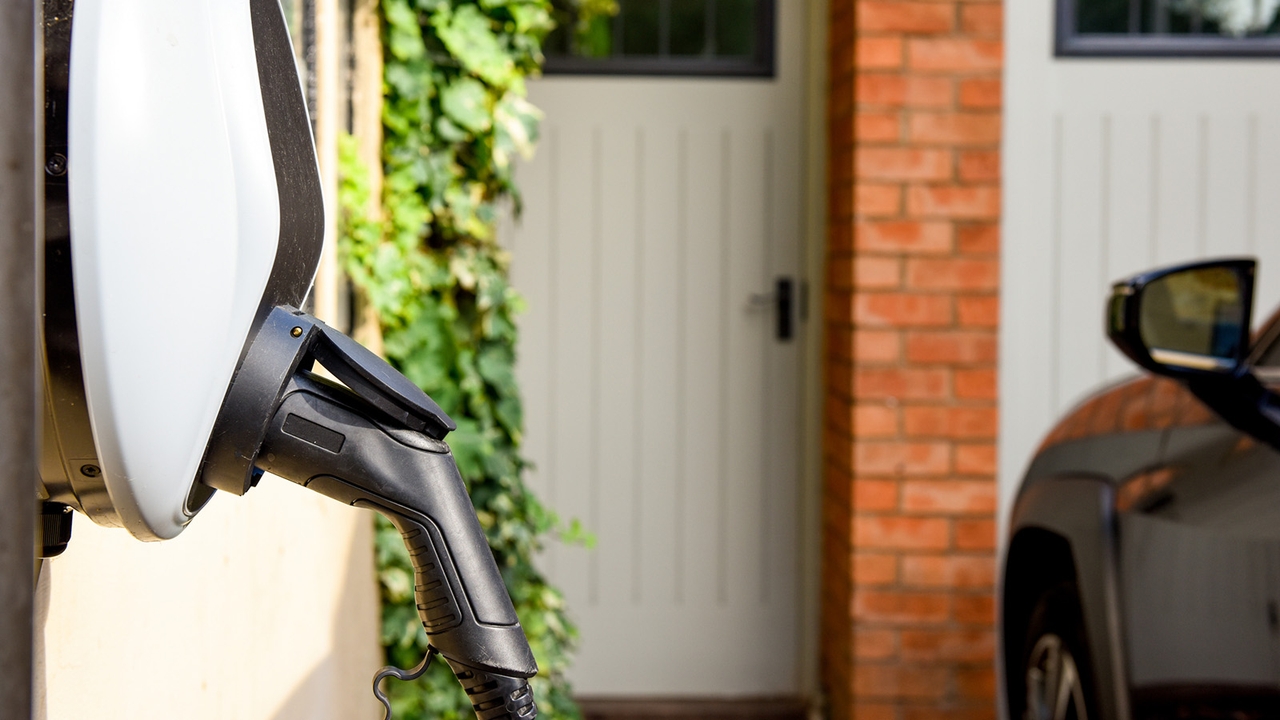
There are several benefits to having your own at-home EV charger installed:
- Faster – a dedicated charging point is much faster than a standard household plug
- Convenient – you can charge your car whenever you want, often eliminating the need to find public chargers entirely
- Safety – your car and charging equipment remains entirely within your property, so there’s less risk of theft, vandalism, or exposure to the elements
- Resale value – while predicting house prices is something of a dark art, there’s no question that having a home EV charge point will increase the value of your home, and will somewhat offset the price of the installation
How much does it cost to install an EV home charger?
This will vary depending on the type of charging point you install, but costs are typically between £800 and £1,500.
There are government grants available to help reduce this cost, but these are only available to individuals who rent or own a flat, or for landlords, and don’t apply if you own your own house. The grant is for £350 or 75% of the installation value, whichever is lower.
Power – how fast are home chargers?
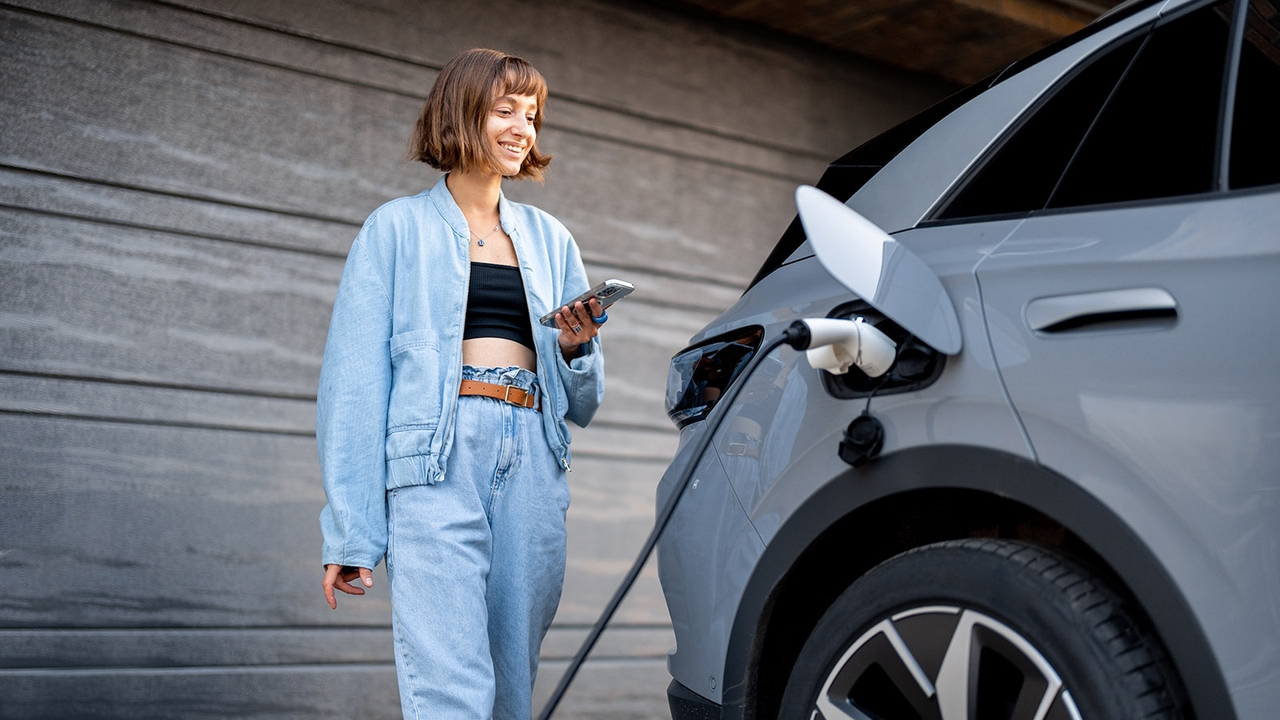
You’ll usually find a choice of three power outputs for EV chargers.
The slowest 3kW chargers (3.6kW in practice) are only slightly faster than a standard three-pin socket but are usually the most affordable option that’s specifically intended to charge EVs. This charge speed is probably enough if you have a fairly low daily mileage and your EV’s battery isn’t very big, but will likely feel underpowered if you trade up to a model with a larger pack.
Most UK homeowners opt to have a 7kW (sometimes up to 7.4kW) charge point installed and this is the option we’d recommend for most buyers. Charge times are nearly halved compared to the 3.6kW, making it feasible to charge EVs with big battery packs overnight, and the installation costs are barely any higher than the 3.6kW unit.
The fastest domestic charging points for EVs are rated at 22kW and, if your EV can accept that speed, will drastically reduce charge times again compared to a 7kW point. These aren’t usually practical for home use because you’ll need to have a very expensive three-phase power supply installed. That said, they’re a good choice for commercial properties like factories or farms that may already have three-phase power installed.
Choosing a tethered or untethered charger
Tethered charger – these have a charge cable permanently attached to the charging unit. This may be the more convenient option, because all you have to do is uncoil the cable and attach it to the car.
Untethered charger – this is essentially just the socket on the wall, with no built-in cable, also called ‘socket-only’ chargers. These are slightly more flexible, allowing you to buy different length cables or ones with different connectors as needed.
Neither option is truly better so it’s more a question of whether you want the convenience of a tethered charge point or the flexibility of an untethered one.
EV charging connector types
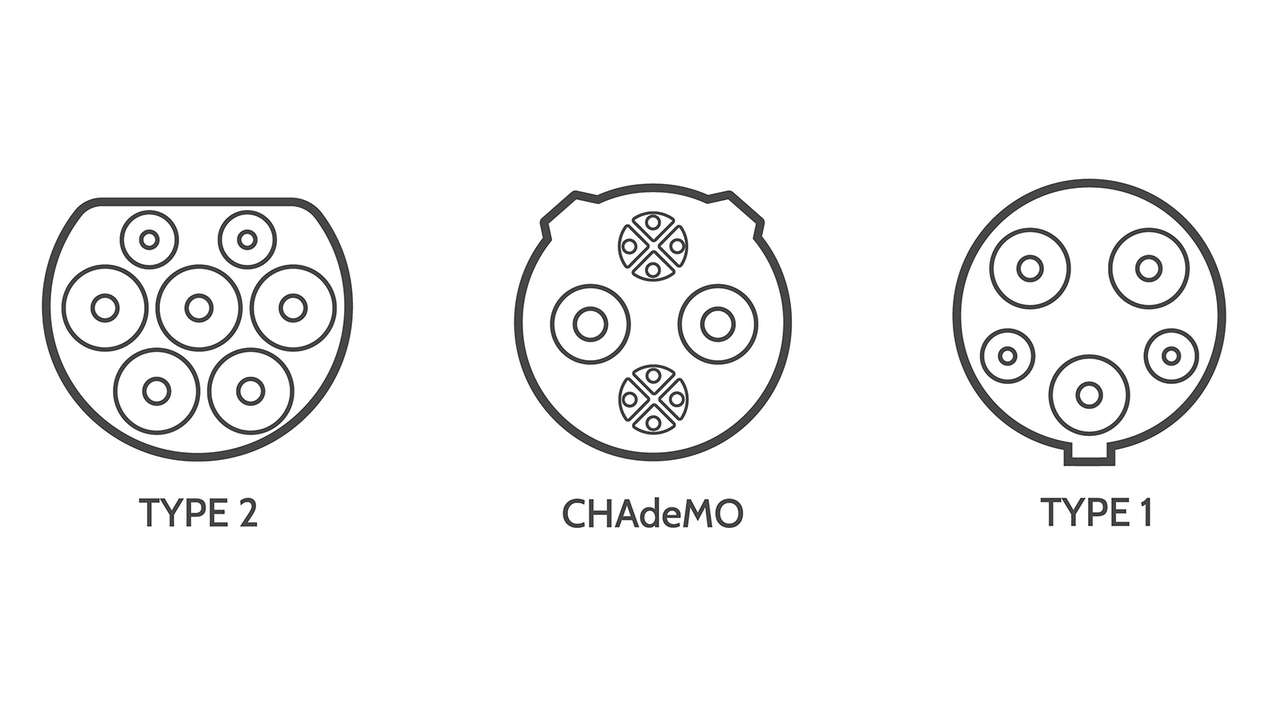
There are several different types of EV charging connector and, while most EVs on sale in the UK now use the same variety, you may still come across slightly older EVs that use a connector type that’s less common in the UK.
Type 2, also called Mennekes, is the most common EV connector used in the UK and Europe. This connector is compatible with all public and home charge points. Most recent EVs have CCS2 connectors in their charging ports, which has a Type 2 connector on its top half and an additional oval-shaped connector below it for DC fast charging.
ChaDeMo is a Japanese charging standard that’s now nearly phased out in Europe, although you'll find it on Nissan Leaf and Mitsubishi Outlander models.
Type 1 – also called J1772 – has mostly been phased out in Europe but can still be found on some models of Nissan Leaf. It remains in widespread use in North America. Some UK public charge points have a built-in Type 1 connection, but you can also buy a Type 1 to Type 2 adapter to give you more charging options.
Smart EV chargers
Many EV home chargers also offer smart features that can be controlled through an app on your phone. You can usually monitor and choose what time you want to charge your EV, allowing you to take advantage of cheaper nighttime electricity costs.
How do you charge your electric car if you live in a flat?

There are two main options available to you if you want to live in a flat and charge your EV.
Ideally, if you have a dedicated parking spot, you might be able to get a proper charging point installed. If you’re renting, you’ll want to discuss this with your landlord or, if you own your flat, you’ll probably need to agree it with the building’s management.
Your other options are the thousands of public charging stations across the country. You might be able to find one at the supermarket, at a service station or possibly at your work place. The downside here is that the reliability of the public network can be patchy and it can be quite expensive, especially if you take advantage of DC fast charging.
How do you charge an electric car if you don’t have a driveway?
If you don’t have a driveway, charging an EV on the street can be a little trickier. Like EV owners in flats, your best bet for now might be to charge at work or using a public charger.
However, more councils are starting to install lamppost charging points. These allow you to directly plug in to a lamppost when you park up on the street and start charging your car. Check with your local council about lamppost charger availability.
Can you run a charging cable across a pavement?

You can’t run an EV charging cable across the road but there are no legal restrictions on running a cable across the pavement. Before you do, however, you should consider these potential issues:
- You can only run the cable across the pavement when charging your vehicle and must remove it once finished
- You could be held liable if a pedestrian trips and falls over your cable
- Someone might tamper with or vandalise your cable if it’s running across the pavement
If your only option is to run a cable across the pavement, the best solution is to buy a brightly coloured cable protector like you’d find on a building site. These yellow-and-black ramps will hold your cable in place and provide a safe surface for pedestrians to step over.
Ready to go electric?
Motorpoint has a huge choice of nearly new electric cars. For even more info, take a look at our EV jargon buster or, to see what kind of plug-in cars you might like, check out these great affordable electric cars.

































